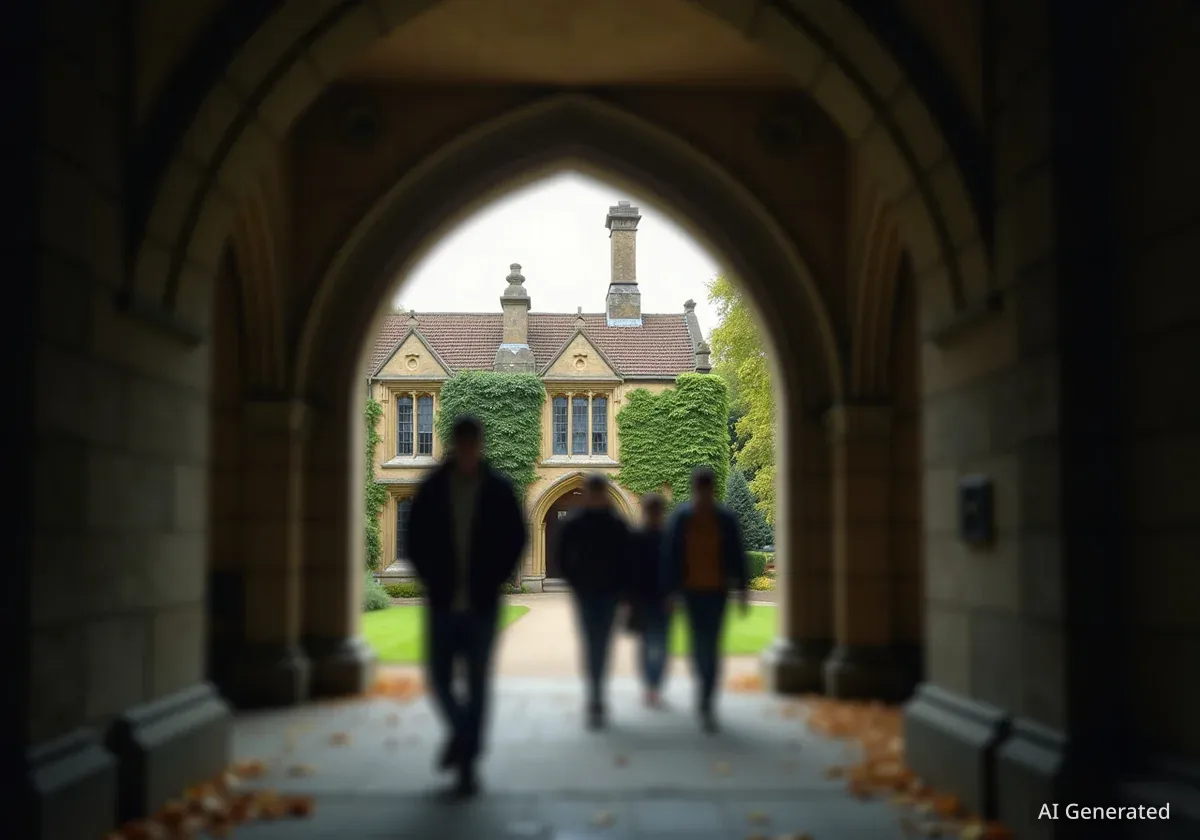Harvard University President Alan M. Garber recently concluded an unannounced trip to London, where he met with students and senior officials at the University of Oxford. The visit occurred against a backdrop of ongoing political and financial challenges for the university in the United States, highlighting the growing importance of its international relationships.
During a reception with Harvard's Rhodes Scholars at Oxford, Garber addressed the university's protracted disputes with the Trump administration. He disclosed that these challenges have directly impacted students, preventing some international scholars from enrolling at the Cambridge, Massachusetts, campus.
Key Takeaways
- Harvard President Alan M. Garber made an unannounced trip to London to meet with students and Oxford University officials.
- Garber confirmed four admitted international students were unable to enroll due to U.S. government policies and visa issues.
- The visit underscores Harvard's efforts to strengthen international ties amid domestic political pressures, including a previous $2.7 billion federal funding freeze.
- Oxford and other universities offered support to Harvard during its disputes with the U.S. administration.
Navigating Political Headwinds
President Garber’s visit was more than a routine diplomatic engagement. It served as a platform to discuss the significant pressures Harvard has faced from Washington. Accompanied by his wife Anne Yahanda and other senior Harvard officials, Garber spoke candidly with students about the university's situation.
An attendee at the Oxford reception reported that Garber detailed how four international students admitted to Harvard College were ultimately unable to begin their studies. He attributed three of these cases to the blanket travel bans implemented by the Trump administration. The fourth case was also suggested to be linked to the broader disputes between Harvard and the federal government.
A History of Conflict
The relationship between Harvard and the Trump administration has been strained for some time. Since May, the administration has attempted to restrict the university's ability to host international students. These efforts included an initial move to revoke Harvard's authorization to enroll them, followed by a proposed suspension of all student travel to the U.S. Both measures were successfully blocked in federal court.
Despite the legal victories, the practical consequences for students have been severe. Many international students reported significant visa delays and other administrative hurdles over the summer, creating uncertainty and disrupting their academic plans.
The Financial Impact of Federal Disputes
The conflict has also had serious financial implications. Starting in April, the White House initiated a series of funding freezes that ultimately blocked $2.7 billion in federal grants and contracts awarded to Harvard. This move effectively halted a vast range of research and academic programs that rely on federal support.
$2.7 Billion Frozen: Federal grants and contracts for Harvard were suspended for months, impacting nearly all federally funded projects at the university before being reinstated by a court ruling in September.
A court ruling in September ordered the reinstatement of the blocked funds, and the money has since started to flow back to the university. However, the temporary suspension created significant disruption and uncertainty across numerous departments and research labs.
The financial pressure on major universities is not limited to Harvard. Garber had previously planned a trip to India during spring break but canceled it abruptly. The cancellation came after Columbia University was hit with a $400 million federal funding cut, a move widely interpreted within Harvard's administration as a warning from Washington.
Strengthening International Alliances
In his remarks at Oxford, Garber emphasized the importance of global academic solidarity. He noted that in the immediate aftermath of the U.S. administration's actions against Harvard, officials from several international universities, including Oxford, reached out to offer their support.
While Garber did not specify the exact nature of the support offered, the gesture highlights a crucial network of international cooperation among leading academic institutions. This global support system provides a buffer against domestic political pressures and reinforces the shared values of academic freedom and international exchange.
The reception in London was largely informal, allowing Garber to engage directly with students. According to an attendee, he spent most of the hour-long event mingling, sharing stories about his undergraduate days, and discussing his academic interests in economics before delivering his brief formal remarks.
"Officials from several universities — including Oxford — reached out to Harvard to offer support," Garber reportedly told the students, underscoring the value of international academic partnerships during challenging times.
A Pattern of Global Engagement
This trip marks Garber's second reported international journey since becoming president in January 2024 and his first of the year. It follows a similar visit to London just over a year ago, where he met with alumni and officials at the University of Cambridge.
These visits signal a deliberate strategy to reinforce Harvard's global standing and maintain strong relationships with peer institutions abroad. As domestic challenges persist, these international ties become increasingly vital for ensuring the continued flow of talent, ideas, and collaborative research that defines a world-class university.
A spokesperson for Harvard declined to provide an official comment on the trip, maintaining the private nature of the president's international engagements. Nonetheless, the visit sends a clear message about the university's commitment to its global community and its resilience in the face of domestic political challenges.





